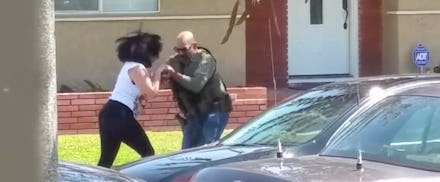When a U.S. Marshal Destroyed a Camera, Local News Blurred Out His Face, Not the Victim's

Another day, another awful police video.
This time, the footage, filmed in residential South Gate, California, and posted to YouTube Sunday, shows a U.S. marshal attacking a woman for the crime of quietly filming him from several feet away.
About halfway through the footage, the gun-toting officer moves towards the woman, grabs the camera out of her hand, throws it to the ground and kicks it.
"Oh shit, they fucked her phone," says the woman who filmed the encounter.
Though the video was bad enough on its own merit, worse still was the first major report on the incident from the mainstream media.
On Tuesday, NBC4 Los Angeles made the decision to blur out the officer's face, presumably to protect his identity, but gave no similar consideration to the victim of the attack. The concern for the officer was especially strange, as he can be clearly seen on the original YouTube video, which as of Wednesday morning had been viewed nearly 600,000 times.
While NBC4 included the original YouTube in their Web story, blurring the offender's face on television only served to expose the victim and shield the officer from NBC4's television audience.
"We weren't sure if he was an undercover cop," an employee named Stephanie told Mic on behalf of NBC4. She added that the decision had been made as a group by the station. The station's trepidation came in spite of the fact that the marshal had been openly wearing clothing identifying him as a member of law enforcement and had been carrying a massive weapon in broad daylight.
According to reports, the officer was part of a multi-agency sting operation against a biker gang that was believed to be operating out of the area.
A national problem: NBC4's misguided attempt to "protect" officers from the glare of public oversight echoes attempts around the country which have been made to limit individuals from documenting police misconduct.
In Texas, Republican state representative Jason Villalba attempted to criminalize anyone recording within 25 feet of an officer, before public outrage forced him to back down. Last year, an Illinois law sought to forbid "oral communication between two or more persons," which did not exempt police, when police felt they would otherwise have a reasonable expectation of privacy, the Huffington Post reported.
Journalism is supposed to provide oversight by the people and protect them from abuse by the powerful. NBC4's decision to shield the marshal from the glare of the spotlight was a shameful move and is perhaps part of the reason why American trust in the mainstream media continues to plummet.
If ordinary Americans are intimidated from exercising their right to watch the police, the damage to everyone could be far greater than one broken cell phone.
h/t The Daily Dot